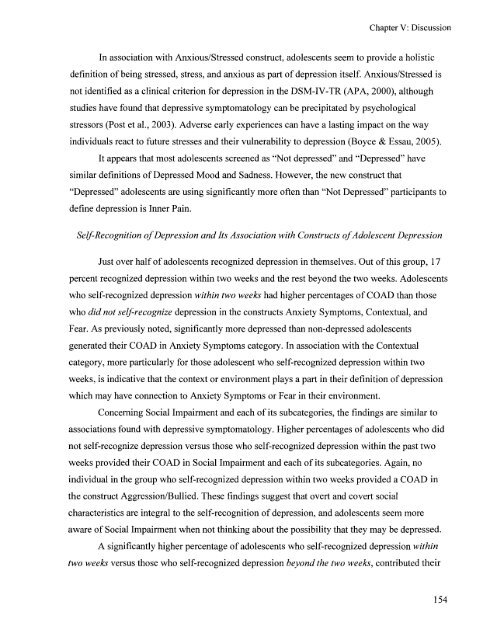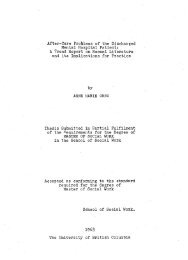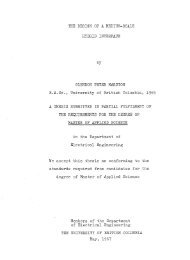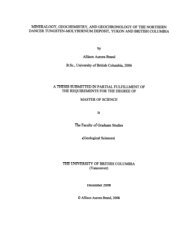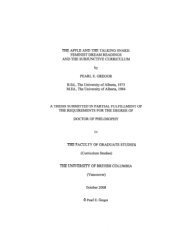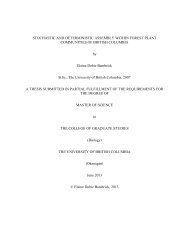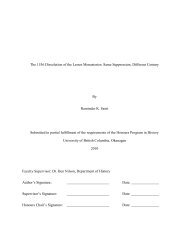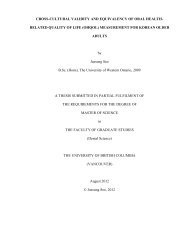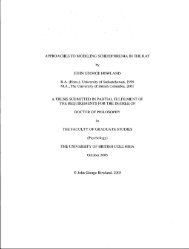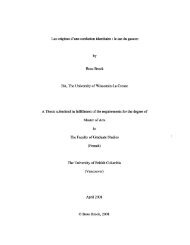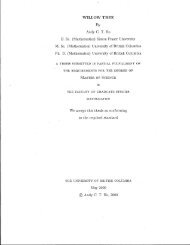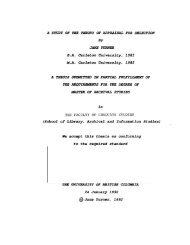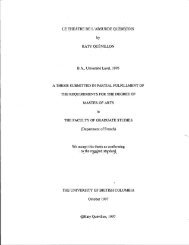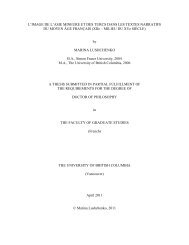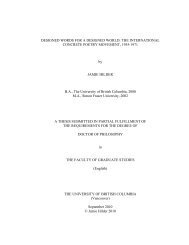how do adolescents define depression? - cIRcle - University of ...
how do adolescents define depression? - cIRcle - University of ...
how do adolescents define depression? - cIRcle - University of ...
Create successful ePaper yourself
Turn your PDF publications into a flip-book with our unique Google optimized e-Paper software.
Chapter V: Discussion<br />
In association with Anxious/Stressed construct, a<strong>do</strong>lescents seem to provide a holistic<br />
definition <strong>of</strong> being stressed, stress, and anxious as part <strong>of</strong> <strong>depression</strong> itself. Anxious/Stressed is<br />
not identified as a clinical criterion for <strong>depression</strong> in the DSM-IV-TR (APA, 2000), although<br />
studies have found that depressive symptomatology can be precipitated by psychological<br />
stressors (Post et al., 2003). Adverse early experiences can have a lasting impact on the way<br />
individuals react to future stresses and their vulnerability to <strong>depression</strong> (Boyce & Essau, 2005).<br />
It appears that most a<strong>do</strong>lescents screened as "Not depressed" and "Depressed" have<br />
similar definitions <strong>of</strong> Depressed Mood and Sadness. However, the new construct that<br />
"Depressed" a<strong>do</strong>lescents are using significantly more <strong>of</strong>ten than "Not Depressed" participants to<br />
<strong>define</strong> <strong>depression</strong> is Inner Pain.<br />
Self-Recognition <strong>of</strong> Depression and Its Association with Constructs <strong>of</strong> A<strong>do</strong>lescent Depression<br />
Just over half <strong>of</strong> a<strong>do</strong>lescents recognized <strong>depression</strong> in themselves. Out <strong>of</strong> this group, 17<br />
percent recognized <strong>depression</strong> within two weeks and the rest beyond the two weeks. A<strong>do</strong>lescents<br />
who self-recognized <strong>depression</strong> within two weeks had higher percentages <strong>of</strong> COAD than those<br />
who did not self-recognize <strong>depression</strong> in the constructs Anxiety Symptoms, Contextual, and<br />
Fear. As previously noted, significantly more depressed than non-depressed a<strong>do</strong>lescents<br />
generated their COAD in Anxiety Symptoms category. In association with the Contextual<br />
category, more particularly for those a<strong>do</strong>lescent who self-recognized <strong>depression</strong> within two<br />
weeks, is indicative that the context or environment plays a part in their definition <strong>of</strong> <strong>depression</strong><br />
which may have connection to Anxiety Symptoms or Fear in their environment.<br />
Concerning Social Impairment and each <strong>of</strong> its subcategories, the findings are similar to<br />
associations found with depressive symptomatology. Higher percentages <strong>of</strong> a<strong>do</strong>lescents who did<br />
not self-recognize <strong>depression</strong> versus those who self-recognized <strong>depression</strong> within the past two<br />
weeks provided their COAD in Social Impairment and each <strong>of</strong> its subcategories. Again, no<br />
individual in the group who self-recognized <strong>depression</strong> within two weeks provided a COAD in<br />
the construct Aggression/Bullied. These findings suggest that overt and covert social<br />
characteristics are integral to the self-recognition <strong>of</strong> <strong>depression</strong>, and a<strong>do</strong>lescents seem more<br />
aware <strong>of</strong> Social Impairment when not thinking about the possibility that they may be depressed.<br />
A significantly higher percentage <strong>of</strong> a<strong>do</strong>lescents who self-recognized <strong>depression</strong> within<br />
two weeks versus those who self-recognized <strong>depression</strong> beyond the two weeks, contributed their<br />
154


